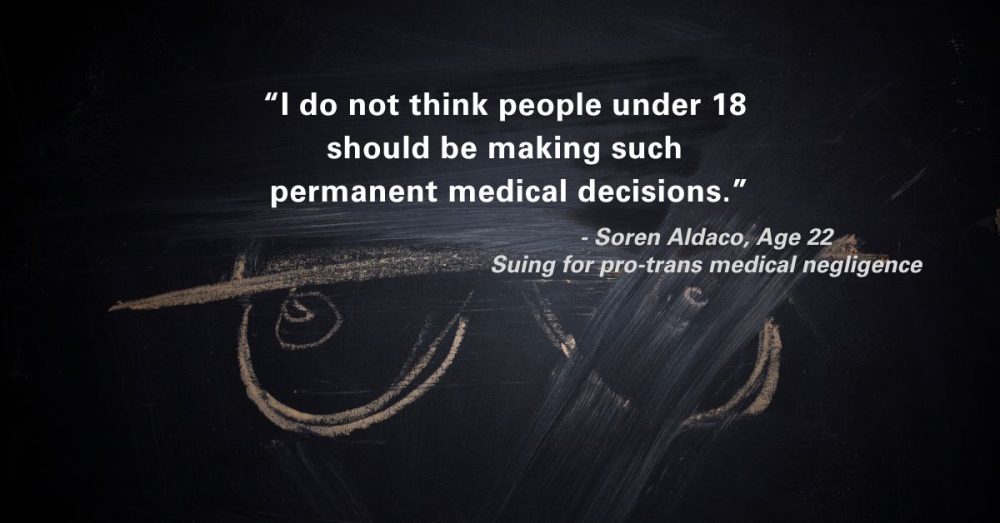Soren Aldaco, a 22-year-old student at the University of Texas at Austin, is suing an extensive list of medical providers who allegedly enabled her transgender hormone usage and performed a double mastectomy she now regrets.
A Tarrant County judge issued an order in mid-July to reinstate Aldaco’s claims against a DFW area medical group and worker in the lawsuit, as first reported by The Dallas Express.
The judge’s order ensured that Del Scott Perry, a nurse practitioner, and his employer, Texas Health Physicians Group, would face legal action. Aldaco alleged that Perry initiated the process of putting her on transgender hormones when she was 17 years old.
“[Perry] definitely had an agenda,” Aldaco recently told DX in an exclusive interview. “His child is transgender. I don’t think anyone is evil, but I do think he was mindless in his prescription of these drugs because of that familial connection that gave him blinders to the vulnerabilities of other children.”
Texas Health Physicians Group’s legal team did not respond to a request for comment.
Aldaco said her taking transgender hormones caused her to experience complications, such as vaginal atrophy and joint pain. Still, she said she never encountered any pushback from medical workers during her initial transition.
This purported lack of intervention extended to her decision to get a double mastectomy at the Crane Clinic in Austin when she was 19. She said that medical workers quickly dismissed information about the risks or side effects with assurances that the procedure would be beneficial to her.
“I was not thinking what concretely was going to happen to my body,” Aldaco told DX. “I thought about it a lot, but it was more of a fanatic, obsessive thinking.”
Surgeons allegedly botched the surgery, which led Aldaco to seek emergency care at the University of Texas Southwestern Medical Center in Dallas. She was diagnosed with “massive bilateral hematomas,” which required doctors to re-open her incisions to insert drains to evacuate blood and other bodily fluids from her chest cavity. The draining of fluids went on for a week, according to the lawsuit.
Aldaco said medical workers failed to consider how her ADHD and depression may have influenced her gender dysphoria at a young age.
“The connection was ignored all throughout my treatment from age 15 onward,” she told DX.
Aldaco said she knows many detransitioners who similarly experienced limited curiosity from doctors regarding the relationship between their medical history and the decision to transition genders.
“When you have someone with a history of mental illness, who has a diagnosis such as autism or ADHD, that would imply that their ability to understand concepts is different than your average person,” she continued. “You can’t just treat them mindlessly as my doctors treated me. You have to be mindful of your approach and how they’re interpreting it.”
Aldaco praised Texas’ law banning the administration of transgender hormones and other related medical interventions when it comes to minors, adding she hopes the state can develop a clear framework on how to treat gender dysphoria.
“I think Texas is effective in many ways, but I do wish we had a more standardized therapeutic approach for these children who are struggling with reconciling their sex,” she told DX. “I do not think people under 18 should be making such permanent medical decisions.”
The American Academy of Pediatrics (AAP) reaffirmed its support for minors being able to obtain transgender hormones or surgeries in a statement last year:
“The AAP and other major medical organizations — including the American Medical Association, the American College of Obstetricians and Gynecologists, and the World Health Organization — support giving transgender adolescents access to the health care they need. The AAP opposes any laws or regulations that discriminate against transgender and gender-diverse individuals or that interfere in the doctor-patient relationship.”


